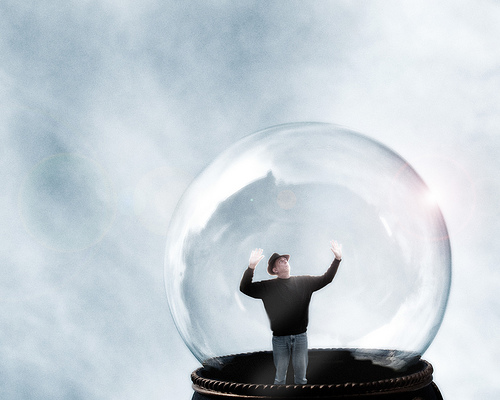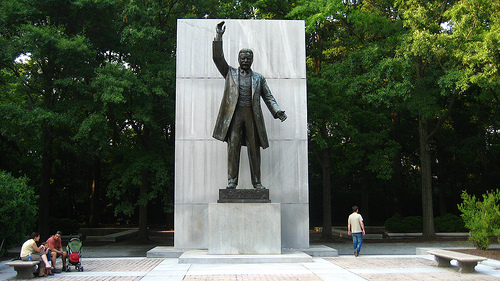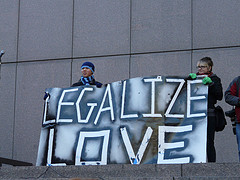Researchers are attempting to “define a second genetic code: one that predicts how segments of messenger RNA transcribed from a given gene can be mixed and matched.”
All Articles
Brendan Kiley looks at the history, meaning, and practice of suicide. “For most people, the subject is so taboo it’s hard to deal with—even among people who deal with suicide for a living.”
Walt Mossberg provides a basic explanation of what cloud computing is, and what it might mean for us in the near future.
“By 2050, almost 70 percent of the world’s estimated 10 billion inhabitants—or more than the number of people living today—will be part of massive urban networks.”
If a desperate, last-ditch attempt to cap the Deepwater Horizon wellhead fails, environmental damage to the Gulf of Mexico may profoundly and permanently alter the area.
Emily Bazelon writes that a citizen charged with a crime needs to be read their Miranda rights—even if they are charged with an act of terrorism.
Some winemakers and enthusiasts believe that wine tastes better on so-called “fruit” days—those days in the lunar calendar when water and saps rise.
“A growing body of evidence suggests that humans do have a rudimentary moral sense from the very start of life,” writes Paul Bloom. “Some sense of good and evil seems to be bred in the bone.”
Greece has plunged the euro into its worst crisis ever, and if economists are unable to bring discipline to the country there will be much more at stake than the fate of the currency.
The Web and cloud computing have made the work of archivists and record keepers faster than ever before, but is information lost in the internet’s labyrinth any more accessible than […]
Arizona is facing a backlash after Governor Jan Brewer signed a law making it a crime not to carry immigration papers and authorizing the police to detain anyone suspected of […]
We’ve always had a strange fascination with watching ourselves. Oscar Wilde’s Dorian Gray famously agonized over the reflection of a hedonist life on his portrait, which aged and suffered at […]
The idea that our planet’s climate is changing is nothing new, says environmentalist and writer Bill McKibbon—in fact, the first person to theorize that our planet was warming was a […]
Dr. Fatih Birol, the chief economist of the International Energy Agency, says he has never owned a car. While he admits his decision may seem “unusual” to people in the […]
“There’s this core of people who have become very, very powerful who can do enormous damage to the rest of society and honestly, they really don’t care,” says Simon Johnson, […]
“I remember I was reading Svevo, it was ‘The Confessions of Zeno’…And I looked—I was lying in bed and I looked down at the floor and there was a little […]
This remarkable video was made by the new Dean of the Harvard Business School, Nitin Nohria. It is Professor Nohria’s equivalent, in a way, of will.i.am’s Yes, We Can, the […]
The D.C. think tank archipelago constitutes a kind of shadow government. These organizations house policy shops, lobbying and advocacy campaigns, media production, education and training programs, and much more. They […]
Other cultures may value conformity, but Americans are rugged individualists. For better or for worse, we think and choose for ourselves—from which indie band we listen to on the subway […]
The feminist battleground, with its slogans, marches, and campaigns for reproductive rights, has given way to the playground and the fight for lactation rights, stroller rights, and birthing techniques.
A new study suggests that some patients who don’t tolerate antidepressant medications could benefit from a non-invasive treatment that stimulates the brain with an electromagnet.
Charles Murray says we should “finally acknowledge that standardized test scores are a terrible way to decide whether one school is better than another.”
A Brooklyn lawyer is hoping to break new legal ground by offering a brain scan as evidence that a key witness in a civil trial is telling the truth.
“How did we get to the point where just about every new classical dance is meaningless?” asks Laura Jacobs. She thinks premieres today all feel derivative of Forsythe, Tharp, or Martins—or trade in clichés.
Could the fact that so many publishing executives are women mean that there are fewer books being published that appeal to male readers?
Why do so many top Ivy League grads go to work for Wall Street firms like Goldman Sachs and McKinsey? James Kwak says it’s because they offer well-paid, generic business training.
Analysts at the National Counterterrorism Center say the terrorist threat to America is becoming more decentralized and less deadly. But the terrorists are also harder to find.
“The outlets for vindictiveness have multiplied almost to infinity—and your reputation is more fragile than ever,” writes Jeffrey Zaslow. “All of us now live under the threat of easy and instant humiliation.”
For individual birds affected by the oil spill in the Gulf of Mexico, having a person clean the oil from their feathers may be their best chance of survival.
When you cover a beat, you get to know the good guys and the bad guys. If you don’t have strong opinions about who’s who, you’re probably not doing your […]









